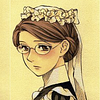Take a photo of a barcode or cover
Brilliant book, richly written, but not so richly as to lose the reader. Can be thick at points, but the freshness of the story and its brilliant construction are a wonder. Deeply informative about the history and politics of the time, as well.
What I liked most about the book was the reflection William had towards the end, on the way he conducted his investigation and the accidental way in which the (wrong) hypotheses he followed lead to the truth (truth caused by rather "random" events). It was a very interesting idea, albeit a bit distressing, given the suggestion of chaos, the apparent lack of governing rules and, ultimately, the lack of our mind's ability to grasp the order of the world...if one exists. (Am I referring to the order or the world itself? Hmm...)
A valuable thing this book brings is the depiction of life in a medieval monastery, the various religious orders and their beliefs, the conflict between the Pope and the Emperor and the painful impact it had on the other people...and how the love of truth, if it's too fiery, can plunge you into darkness.
A valuable thing this book brings is the depiction of life in a medieval monastery, the various religious orders and their beliefs, the conflict between the Pope and the Emperor and the painful impact it had on the other people...and how the love of truth, if it's too fiery, can plunge you into darkness.
"Bu kitaplık, belki de içindeki kitapları korumak için var oldu, ama şimdi onları gömmek için yaşıyor."
Bu kitap hakkındaki yorumumu birkaç ana başlık altında toplamak istiyorum.
1. Kitabın Yapısı: Kitap, yedi güne ve günün belirli zamanlarına bölünmüş olarak işleniyor. Bu durum aslında okuyucuyu da inanılmaz bir şekilde içine çekiyor ve gerçekçilik hissi veriyor. Kitapla uyudum, kitapla uyandım, tan ağarırken kitapla birlikte dua ettim. Bu yönüyle çok keyif aldığım bir bölümlendirme şekli vardı kitapta.
2. Kitabın Dili: Kitabın, benzer türdeki kitaplara göre daha ağır bir dili olduğunu düşünüyorum. Sadece sıkça geçen Latince göndermelerden dolayı değil (ki yazar bunu kasıtlı olarak Orta Çağ havası vermek için yaptığını ifade ediyor); aynı zamanda dolaylı anlatımı seven bir dili, Orta Çağ Hristiyanlığıyla birleştirip, üzerine bir de felsefi sorular eklediğinizde... Sanırım zaman zaman kaybolduğumu hissettiğim noktalar oldu. Çok fazla terimlerin kullanıldığı bir roman. Bu yüzden polisiye diye kolayca okunacağını düşünmemek gerek.
3. Kitabın Konusu: Şimdiye kadar Katolik kilisesinin tarihi üzerine bir kitap okuduğumu hatırlamıyorum. Çekincem, sayfalarca tarihi bilginin, bir ders kitabı gibi yüklenmesi ihtimaliydi. Ama gördüm ki, hikayeye çok güzel yedirilmiş tarihi gerçeklikleri ister istemez öğreniyorsunuz.
Kitaba yakışır uzun bir yorum oldu. Ama sonuna geldiğimde gözyaşlarımı tutamadım. Tanrı bizi yazarların çılgınlıklarından ve şerrinden korusun. Bir süre sonra yine okuyup, özellikle tarihi açıdan Eco'nun analizlerini güncellemek isteyeceğimi düşünüyorum. Yazarın büyük bir tarihçi olması, kitabı benim için tekrar ziyaret edilecek bir durak olarak cazip kılıyor.
--------------------------------------------------------------------
"This library perhaps existed to protect the books inside, but now it lives to bury them."
I would like to collect my comments about this book under a few main headings.
1. Structure of the Book: The book is divided into seven days and certain times of the day. This situation actually draws the reader in incredibly and gives a feeling of realism. I slept with a book, woke up with a book, and prayed with a book at dawn. In this respect, there was a way of partitioning the book that I really enjoyed.
2. Language of the Book: I think the book has a heavier language than similar types of books. Not only because of the frequent Latin references (which the author states that he deliberately did this to give a medieval atmosphere); At the same time, when you combine a language that loves indirect expression with Medieval Christianity and add philosophical questions... I think there were points where I felt lost from time to time. A novel in which many terms are used. That's why we shouldn't think that it will be easily read as a detective story.
Subject of Book 3: I don't remember ever reading a book on the history of the Catholic church. My reservation was that pages of historical information might be loaded like a textbook. But I saw that you inevitably learn the historical realities that are beautifully integrated into the story.
It was a long comment worthy of the book. But when I got to the end, I couldn't hold back my tears. May God protect us from the madness and evil of writers. I think I will want to read it again after a while and update Eco's analysis, especially from a historical perspective. The fact that the author is a great historian makes the book attractive for me as a stop to revisit.
Bu kitap hakkındaki yorumumu birkaç ana başlık altında toplamak istiyorum.
1. Kitabın Yapısı: Kitap, yedi güne ve günün belirli zamanlarına bölünmüş olarak işleniyor. Bu durum aslında okuyucuyu da inanılmaz bir şekilde içine çekiyor ve gerçekçilik hissi veriyor. Kitapla uyudum, kitapla uyandım, tan ağarırken kitapla birlikte dua ettim. Bu yönüyle çok keyif aldığım bir bölümlendirme şekli vardı kitapta.
2. Kitabın Dili: Kitabın, benzer türdeki kitaplara göre daha ağır bir dili olduğunu düşünüyorum. Sadece sıkça geçen Latince göndermelerden dolayı değil (ki yazar bunu kasıtlı olarak Orta Çağ havası vermek için yaptığını ifade ediyor); aynı zamanda dolaylı anlatımı seven bir dili, Orta Çağ Hristiyanlığıyla birleştirip, üzerine bir de felsefi sorular eklediğinizde... Sanırım zaman zaman kaybolduğumu hissettiğim noktalar oldu. Çok fazla terimlerin kullanıldığı bir roman. Bu yüzden polisiye diye kolayca okunacağını düşünmemek gerek.
3. Kitabın Konusu: Şimdiye kadar Katolik kilisesinin tarihi üzerine bir kitap okuduğumu hatırlamıyorum. Çekincem, sayfalarca tarihi bilginin, bir ders kitabı gibi yüklenmesi ihtimaliydi. Ama gördüm ki, hikayeye çok güzel yedirilmiş tarihi gerçeklikleri ister istemez öğreniyorsunuz.
Kitaba yakışır uzun bir yorum oldu. Ama sonuna geldiğimde gözyaşlarımı tutamadım. Tanrı bizi yazarların çılgınlıklarından ve şerrinden korusun. Bir süre sonra yine okuyup, özellikle tarihi açıdan Eco'nun analizlerini güncellemek isteyeceğimi düşünüyorum. Yazarın büyük bir tarihçi olması, kitabı benim için tekrar ziyaret edilecek bir durak olarak cazip kılıyor.
--------------------------------------------------------------------
"This library perhaps existed to protect the books inside, but now it lives to bury them."
I would like to collect my comments about this book under a few main headings.
1. Structure of the Book: The book is divided into seven days and certain times of the day. This situation actually draws the reader in incredibly and gives a feeling of realism. I slept with a book, woke up with a book, and prayed with a book at dawn. In this respect, there was a way of partitioning the book that I really enjoyed.
2. Language of the Book: I think the book has a heavier language than similar types of books. Not only because of the frequent Latin references (which the author states that he deliberately did this to give a medieval atmosphere); At the same time, when you combine a language that loves indirect expression with Medieval Christianity and add philosophical questions... I think there were points where I felt lost from time to time. A novel in which many terms are used. That's why we shouldn't think that it will be easily read as a detective story.
Subject of Book 3: I don't remember ever reading a book on the history of the Catholic church. My reservation was that pages of historical information might be loaded like a textbook. But I saw that you inevitably learn the historical realities that are beautifully integrated into the story.
It was a long comment worthy of the book. But when I got to the end, I couldn't hold back my tears. May God protect us from the madness and evil of writers. I think I will want to read it again after a while and update Eco's analysis, especially from a historical perspective. The fact that the author is a great historian makes the book attractive for me as a stop to revisit.
adventurous
challenging
mysterious
slow-paced
Plot or Character Driven:
A mix
Strong character development:
No
Loveable characters:
Yes
Diverse cast of characters:
No
Flaws of characters a main focus:
No
Graphic: Death, Blood, Murder
adventurous
mysterious
reflective
medium-paced
Plot or Character Driven:
A mix
Strong character development:
Yes
Loveable characters:
Yes
Diverse cast of characters:
Yes
Flaws of characters a main focus:
Yes
adventurous
dark
emotional
funny
informative
mysterious
reflective
sad
tense
medium-paced
Plot or Character Driven:
A mix
Strong character development:
Yes
Loveable characters:
Complicated
Diverse cast of characters:
No
Flaws of characters a main focus:
Yes
challenging
dark
mysterious
slow-paced
adventurous
dark
emotional
funny
mysterious
tense
slow-paced
Plot or Character Driven:
Plot
Strong character development:
Yes
Loveable characters:
Complicated
Diverse cast of characters:
N/A
Flaws of characters a main focus:
N/A
As stated by my friend's philosophy professor, "It's the thinking man's Da Vinci Code"
dark
emotional
informative
mysterious
tense






